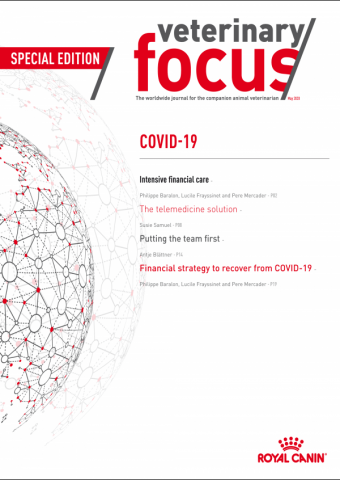
Get access to all handy features included in the IVIS website
- Get unlimited access to books, proceedings and journals.
- Get access to a global catalogue of meetings, on-site and online courses, webinars and educational videos.
- Bookmark your favorite articles in My Library for future reading.
- Save future meetings and courses in My Calendar and My e-Learning.
- Ask authors questions and read what others have to say.
Financial strategy to recover from COVID-19
Get access to all handy features included in the IVIS website
- Get unlimited access to books, proceedings and journals.
- Get access to a global catalogue of meetings, on-site and online courses, webinars and educational videos.
- Bookmark your favorite articles in My Library for future reading.
- Save future meetings and courses in My Calendar and My e-Learning.
- Ask authors questions and read what others have to say.
Read
"Unique problems may require unique solutions, but to survive during the COVID-19 pandemic it is necessary for every veterinary practice to take a long hard look at minimizing costs and also to consider ways in which income can be maintained during this difficult time."
Meet the authors
Philippe Baralon
Dr. Baralon graduated from the École Nationale Vétérinaire of Toulouse, France in 1984 and went on to study Economics (Master of Economics, Toulouse, 1985) and Business Administration (MBA, HEC-Paris 1990). He founded his own consulting group, Phylum, in 1990 and remains one of its partners to this day, acting primarily as a management consultant for veterinary practices in 26 countries worldwide. His main areas of specialization are strategy, marketing and finance, and he is also involved in training veterinarians and support staff in the field of practice management through lectures and workshop, as well as benchmarking the economics of veterinary medicine in different parts of the world. A prolific author, he has authored more than 50 articles on veterinary practice.

.
Lucile Frayssinet
Dr. Frayssinet is a French veterinarian who graduated from the École Nationale Vétérinaire of Toulouse in 2019. She is currently a consultant in Veterinary Practice Management at Phylum, with a international focus on strategic and marketing issues. She has a particular emphasis on the trend of corporatization in veterinary medicine, both in Europe and worldwide, and was also recently involved with an in-depth survey on the evolution of veterinary demographics in France and Europe.

.
Pere Mercader
Dr. Mercader established himself as a practice management consultant to veterinary clinics in 2001 and since then has developed this role in Spain, Portugal and some Latin-American countries. His main accomplishments include authoring profitability and pricing research studies involving Spanish veterinary clinics, lecturing on practice management in more than 30 countries, and authoring the textbook “Management Solutions for Veterinary Practices” which is published in Spanish, English and Chinese and has sold worldwide. In 2008, he co-founded VMS (Veterinary Management Studies), a business intelligence firm that provides a benchmarking service for more than 800 Spanish veterinary practices. Dr. Mercader was also a co-founder of the Spanish Veterinary Practice Management Association (AGESVET) and served on its board for eight years.

Key Points
- In the toughest weeks of the current pandemic veterinary practices can expect to see a significant drop in their income, which if sustained could threaten their very existence.
- In terms of minimizing fixed costs, aim to reduce payroll costs by roughly the same proportion as the degree of revenue lost from providing veterinary services.
- Since lockdown will result in a clinic’s caseload decreasing considerably, it is important to limit revenue loss by maintaining, and if possible increasing, the average transaction value.
- A combination of common sense, generosity, creativity and service orientation may greatly affect how a practice copes during and after the crisis.
.
Introduction
When facing a crisis such as COVID-19 we need to deal with uncertainty. At the time of writing neither the magnitude nor the duration of the pandemic is known – but it is already obvious that the virus has had a very rapid and violent impact on the economics of veterinary business. Hopefully, it will be relatively short-lived. However it is apparent that during this period veterinary practice owners will experience a dramatic drop in revenue, so it is essential to reduce costs in order to minimize losses and avoid a financial crisis. Unfortunately, given the timeframe of the present pandemic it is impossible to fully adapt expenditure in proportion to income because of the importance of fixed costs. This paper offers a blueprint to help maintain a practice through these difficult next few weeks or months, and Table 1 offers a summary in the form of a priority action grid (Figure 1). [...]

Get access to all handy features included in the IVIS website
- Get unlimited access to books, proceedings and journals.
- Get access to a global catalogue of meetings, on-site and online courses, webinars and educational videos.
- Bookmark your favorite articles in My Library for future reading.
- Save future meetings and courses in My Calendar and My e-Learning.
- Ask authors questions and read what others have to say.
About
How to reference this publication (Harvard system)?
Author(s)
Copyright Statement
© All text and images in this publication are copyright protected and cannot be reproduced or copied in any way.Related Content
Readers also viewed these publications
Subscribe
Access to the content of the Veterinary Focus website is reserved for animal health professionals. If you do not yet have a user account with Royal Canin you can create a free account by selecting the New User form. Subscription to the journal is free and issues in your preferred language can be obtained at the Veterinary Focus website.






Comments (0)
Ask the author
0 comments